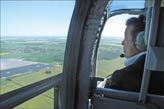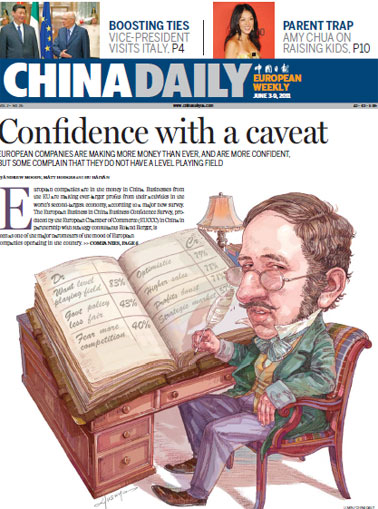Society
New digging begins at Qin burial pit
Updated: 2011-06-04 07:46
By Zhang Yan (China Daily)
BEIJING - Northwest China's Shaanxi province initiated the comprehensive archaeological and excavation work at the K9901 attendant burial pit - one of 180 funerary pits of the Qin Shihuang (259-210 BC) tomb - and its surrounding construction sites on Friday, according to the site's archaeological team.
The burial pit is located in the southeast area of the Tomb of Qin Shihuang (the "First Emperor" of a united China), and occupies a 700-square-meter area of the burial area. The tomb site, situated in the suburban area of Xi'an city, is divided into two parts: an 8-square-kilometer cemetery site and 56.25-square-kilometer multi-burial areas.
| ||||
From the test excavation, one 70-cm-wide and 61-cm-high tripod vessel and 11 pottery figurines were uncovered in the burial area. The tripod vessel weighed 212 kg, with an elegant shape, grand imposing manner, and smooth ridges. The pottery figurines stood bare on their upper bodies, which was the first time warriors have been found without armor or war shirts, Zhang said.
Twelve years later, the new digging will provide "a comprehensive and in-depth understanding of the structure, characters and contents of the K9901 funerary pit," Zhang said.
He said the excavation work will last until the end of this year, and the archaeological team is made up of 30 members, including five experts.
"We will pay attention to making regular archaeological excavations, protecting the historical remains and heritage, and presenting the unearthed cultural relics at the same time," he said.
According to him, the partial test excavation in 1999 was preliminary and didn't reflect the complete nature or contents of the funerary pit at all.
"The comprehensive and integrated excavation will provide important academic information for research of the funerary and tomb system in the Qin grave. Meanwhile, it can present a rich display of heritages to the public through scientific research of archaeological excavation and relics protection," he said.
Zhang acknowledged they may still face some challenges during the grave uncovering. "It's very difficult to deal with and protect the historical remains on the scene, and most of the unearthed relics are paintings and terracotta figurines, which are very friable."
With relatively small scale and simple form, the K9901 funerary pit is one of more than 180 burial areas of Qin Shihuang. Since 1974, more than 30 funerary pits have been excavated by Chinese archaeological teams.
"The full excavation of the K9901 is an important sign to make combination of excavation and exploration during the archaeology work, and accumulate valuable experiences for the later exploring of many large-scale and complicated graves," Song Zhaolin, researcher on unearthed relics from the National Museum of China, said on Friday.
"But it's essential to make full research and investigation work of the funerary site in the early days, and prepare for the emergency plans," he said.
"For example, you may come across the delicate silk products, brocade materials or lacquerwork, which are very precious, but their nature and shape can change when they are exposed to the humid air. Or you may encounter poison gas or animal bones, so you should be prepared to cope with them ," he added.
E-paper

Harbin-ger of change
Old industrial center looks to innovation to move up the value chain
Chemical attraction
The reel Mao
Improving app-iness
Specials

Vice-President visits Italy
The visit is expected to lend new impetus to Sino-Italian relations.

Birthday a new 'starting point'
China's national English language newspaper aims for a top-notch international all-media group.

Sky is the limit
Chinese tycoon conjures up green dreams in Europe with solar panels



